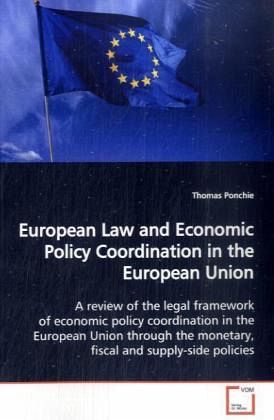
European Law and Economic Policy Coordination in the European Union
A review of the legal framework of economic policy coordination in the European Union through the monetary, fiscal and supply-side policies
Versandkostenfrei!
Versandfertig in 6-10 Tagen
49,00 €
inkl. MwSt.

PAYBACK Punkte
0 °P sammeln!
This book identifies the legal framework of economicpolicy coordination in place within the Economic andMonetary Union of the European Union, and analysesit through the monetary, fiscal and supply-side policies.Chapter 1 focuses on the EMU monetary policy and itslegal system. The centralized EMU monetary policy isanalysed and it is argued that further coordinationis needed with the other economic policies.Chapter 2 deals with the EU fiscal policy and isdivided into two main sections: the Broad EconomicPolicy Guidelines and the Stability and Growth Pact.The BEPGs section insists on the intergov...
This book identifies the legal framework of economic
policy coordination in place within the Economic and
Monetary Union of the European Union, and analyses
it through the monetary, fiscal and supply-side
policies.
Chapter 1 focuses on the EMU monetary policy and its
legal system. The centralized EMU monetary policy is
analysed and it is argued that further coordination
is needed with the other economic policies.
Chapter 2 deals with the EU fiscal policy and is
divided into two main sections: the Broad Economic
Policy Guidelines and the Stability and Growth Pact.
The BEPGs section insists on the intergovernmental
and soft law aspect of the BEPGs and their limits for
the conduct of EU fiscal policies.
The SGP section emphasises the multilateral
surveillance system of the SGP and more particularly
the Excessive Deficit procedure and its hard law
aspect for coordinating the national budgetary
policies.
Chapter 3 focuses on the EU supply-side policies and
the Lisbon strategy for employment and reforms, and
particularly emphasises the Open Method of
Coordination chosen at the Lisbon Council in March
2000.
policy coordination in place within the Economic and
Monetary Union of the European Union, and analyses
it through the monetary, fiscal and supply-side
policies.
Chapter 1 focuses on the EMU monetary policy and its
legal system. The centralized EMU monetary policy is
analysed and it is argued that further coordination
is needed with the other economic policies.
Chapter 2 deals with the EU fiscal policy and is
divided into two main sections: the Broad Economic
Policy Guidelines and the Stability and Growth Pact.
The BEPGs section insists on the intergovernmental
and soft law aspect of the BEPGs and their limits for
the conduct of EU fiscal policies.
The SGP section emphasises the multilateral
surveillance system of the SGP and more particularly
the Excessive Deficit procedure and its hard law
aspect for coordinating the national budgetary
policies.
Chapter 3 focuses on the EU supply-side policies and
the Lisbon strategy for employment and reforms, and
particularly emphasises the Open Method of
Coordination chosen at the Lisbon Council in March
2000.












